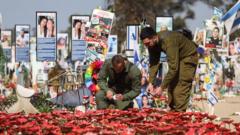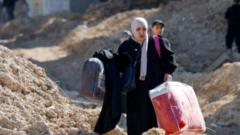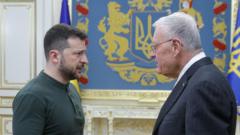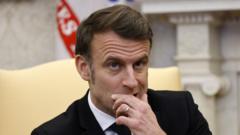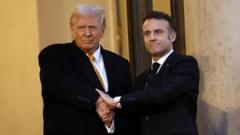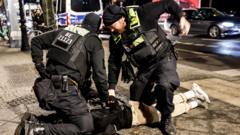The tragic incident where five people were killed at a Christmas market in Magdeburg has sparked anger and questions about security measures, particularly following reports of prior warnings regarding the attacker. Authorities defend their actions, but frustrations among the public and officials highlight a troubling situation.
Germany's Christmas Market Attack: Uncovering Security Lapses and Rising Tensions
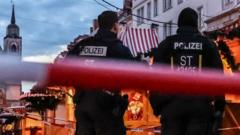
Germany's Christmas Market Attack: Uncovering Security Lapses and Rising Tensions
As investigations continue into the Magdeburg Christmas market attack, public outrage grows over perceived security failures and prior warnings about the suspect.
The recent Christmas market attack in Magdeburg has left a community in mourning and questioning the adequacy of public safety measures. An emergency vehicle access lane was exploited by an assailant, leading to the deaths of five individuals and injuring over 200 others. The tragic event has ignited fierce criticism directed towards German Chancellor Olaf Scholz and local officials, who faced heckling during a visit to the scene as angry voices expressed their discontent over the perceived lapse in security protocols.
In light of the attack, heightened security has been deployed across Christmas markets nationwide, a response to the previous deadly incident in Berlin in 2016. Despite reinforced barriers meant to safeguard patrons, the innovative design allowing for emergency vehicle access ultimately backfired, revealing a glaring grave vulnerability.
Local officials, including Magdeburg's City representative Ronni Krug, justified the access route as necessary for emergency responders during a conventional crisis. He relayed that various agencies had examined and approved the contingency plans, reinforcing a dual priority of visitor safety and rapid evacuation logistics. Krug acknowledged that perhaps the tragic incident could have been an inevitable occurrence.
Reports have surfaced indicating that officials were alerted to the assailant's potential threat a year prior to the attack. The suspect, identified as Taleb al-Abdulmohsen, a Saudi doctor who fled to Germany as a refugee, had gained notoriety on social media for promoting anti-Islamic views. There are reports suggesting that Saudi Arabian authorities sent multiple warnings to German officials regarding al-Abdulmohsen's extreme ideology.
Despite these notifications, local authorities assert that they had conducted investigations into the suspect yet failed to anticipate any violent actions. Questions remain about the inaction following the warnings, as experts urge a reevaluation of past assessments and communications relating to al-Abdulmohsen.
The Magdeburg police chief revealed that the ongoing investigation would further scrutinize the suspect’s background and the nature of any received intel. As efforts to understand the circumstances surrounding this devastating attack continue, the incident serves as a stark reminder of the ongoing challenges in securing public spaces while balancing necessary emergency management.
In light of the attack, heightened security has been deployed across Christmas markets nationwide, a response to the previous deadly incident in Berlin in 2016. Despite reinforced barriers meant to safeguard patrons, the innovative design allowing for emergency vehicle access ultimately backfired, revealing a glaring grave vulnerability.
Local officials, including Magdeburg's City representative Ronni Krug, justified the access route as necessary for emergency responders during a conventional crisis. He relayed that various agencies had examined and approved the contingency plans, reinforcing a dual priority of visitor safety and rapid evacuation logistics. Krug acknowledged that perhaps the tragic incident could have been an inevitable occurrence.
Reports have surfaced indicating that officials were alerted to the assailant's potential threat a year prior to the attack. The suspect, identified as Taleb al-Abdulmohsen, a Saudi doctor who fled to Germany as a refugee, had gained notoriety on social media for promoting anti-Islamic views. There are reports suggesting that Saudi Arabian authorities sent multiple warnings to German officials regarding al-Abdulmohsen's extreme ideology.
Despite these notifications, local authorities assert that they had conducted investigations into the suspect yet failed to anticipate any violent actions. Questions remain about the inaction following the warnings, as experts urge a reevaluation of past assessments and communications relating to al-Abdulmohsen.
The Magdeburg police chief revealed that the ongoing investigation would further scrutinize the suspect’s background and the nature of any received intel. As efforts to understand the circumstances surrounding this devastating attack continue, the incident serves as a stark reminder of the ongoing challenges in securing public spaces while balancing necessary emergency management.


